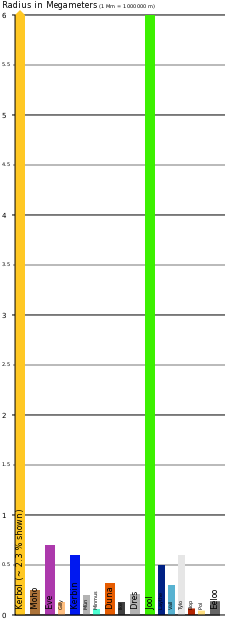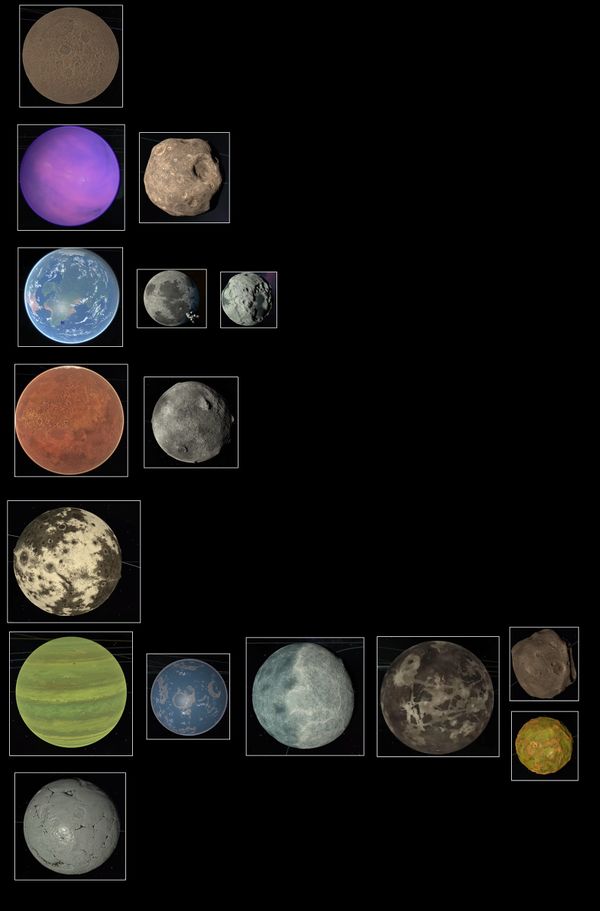Difference between revisions of "Kerbol System"
From Kerbal Space Program Wiki
IndigoLily (talk | contribs) m (Made Mercury and Ceres links point to the correct celestial body page instead of disambiguation) |
|||
| (2 intermediate revisions by 2 users not shown) | |||
| Line 2: | Line 2: | ||
[[File:Bodies of Kerbol en.png|thumb|All [[celestial body|celestial bodies]] orbiting Kerbol with the sizes to scale]] | [[File:Bodies of Kerbol en.png|thumb|All [[celestial body|celestial bodies]] orbiting Kerbol with the sizes to scale]] | ||
[[File:sizes.svg|thumb|Comparison of the radii|upright]] | [[File:sizes.svg|thumb|Comparison of the radii|upright]] | ||
| − | The '''Kerbol System''' is the [[w:Planetary system|planetary system]] in which [[Kerbal Space Program]] takes place. It has [[Kerbol]] as the central body which is orbited by 5 [[planet]]s and 2 [[dwarf planet]]s. Only [[Kerbin]] and [[Laythe]] have an oxygen atmosphere and only Kerbin hosts life. | + | The '''Kerbol System''' is the [[w:Planetary system|planetary system]] in which [[Kerbal Space Program]] takes place, as well as the first explorable planetary system in [[Kerbal Space Program 2]]. It has [[Kerbol]] as the central body which is orbited by 5 [[planet]]s and 2 [[dwarf planet]]s. Only [[Kerbin]] and [[Laythe]] have an oxygen atmosphere and only Kerbin hosts life. |
With the outermost dwarf planet [[Eeloo]] it reaches up to 113 549 713 200 m (about 113.5 [[w:Gigametre|Gm]] or 0.76 [[w:Astronomical unit|AU]]) out into space. Compared to our Solar System it is a very small system, as Earth's periapsis (or more specific perihelion) is about 147 Gm (or 0.98 AU) and thus outside of Eeloo's orbit. | With the outermost dwarf planet [[Eeloo]] it reaches up to 113 549 713 200 m (about 113.5 [[w:Gigametre|Gm]] or 0.76 [[w:Astronomical unit|AU]]) out into space. Compared to our Solar System it is a very small system, as Earth's periapsis (or more specific perihelion) is about 147 Gm (or 0.98 AU) and thus outside of Eeloo's orbit. | ||
| − | |||
| − | |||
[[File:kerbol sizecomp chart.jpg|thumb|600px|center|Graphical comparison of the main celestial bodies in the Kerbol System (sizes to scale)]] | [[File:kerbol sizecomp chart.jpg|thumb|600px|center|Graphical comparison of the main celestial bodies in the Kerbol System (sizes to scale)]] | ||
| Line 23: | Line 21: | ||
| [[Kerbol]] || [[w:Sun|Sun]] | | [[Kerbol]] || [[w:Sun|Sun]] | ||
|- | |- | ||
| − | | [[Moho]] || [[w: | + | | [[Moho]] || [[w:Mercury_(planet)|Mercury]] |
|- | |- | ||
| [[Eve]] || [[w:Venus|Venus]] | | [[Eve]] || [[w:Venus|Venus]] | ||
| Line 31: | Line 29: | ||
| [[Duna]] || [[w:Mars|Mars]] | | [[Duna]] || [[w:Mars|Mars]] | ||
|- | |- | ||
| − | | [[Dres]] || [[w: | + | | [[Dres]] || [[w:Ceres_(dwarf_planet)|Ceres]] |
|- | |- | ||
| [[Jool]] || [[w:Jupiter|Jupiter]] | | [[Jool]] || [[w:Jupiter|Jupiter]] | ||
Latest revision as of 18:06, 16 September 2024
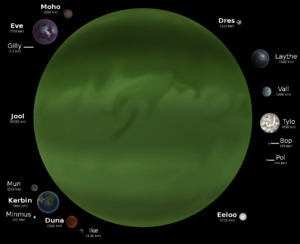
All celestial bodies orbiting Kerbol with the sizes to scale
The Kerbol System is the planetary system in which Kerbal Space Program takes place, as well as the first explorable planetary system in Kerbal Space Program 2. It has Kerbol as the central body which is orbited by 5 planets and 2 dwarf planets. Only Kerbin and Laythe have an oxygen atmosphere and only Kerbin hosts life.
With the outermost dwarf planet Eeloo it reaches up to 113 549 713 200 m (about 113.5 Gm or 0.76 AU) out into space. Compared to our Solar System it is a very small system, as Earth's periapsis (or more specific perihelion) is about 147 Gm (or 0.98 AU) and thus outside of Eeloo's orbit.
Old System in KSP1
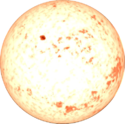 Kerbol Kerbol
| ||||||
 Moho Moho
| ||||||
 Eve Eve
|
 Gilly Gilly
| |||||
 Kerbin Kerbin
|
 Mun Mun
|
 Minmus Minmus
| ||||
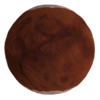 Duna Duna
|
 Ike Ike
| |||||
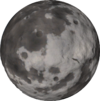 Dres Dres
| ||||||
 Jool Jool
|
 Laythe Laythe
|
 Vall Vall
|
 Tylo Tylo
|
 Bop Bop
|
 Pol Pol
|
|
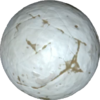 Eeloo Eeloo
| ||||||
| (Sizes and distances not to scale) | ||||||
Relation to the Solar System
| Kerbol system | Solar system |
|---|---|
| Kerbol | Sun |
| Moho | Mercury |
| Eve | Venus |
| Kerbin | Earth |
| Duna | Mars |
| Dres | Ceres |
| Jool | Jupiter |
| Eeloo | Pluto |
Planet from the Kerbol System are defined from a few characteristics:
| Characteristic | How the value was chosen |
|---|---|
| gravity at sea level | hand-picked, followed by a conversion from single to double precision (e.g. gravity on Eve is 1.70000004768372g instead of 1.7g) |
| radius | hand-picked, loosely a tenth the radius of its solar counterpart for Moho, Eve, Kerbin, Duna and Jool |
| rotational period | hand-picked or tidally locked, except Kerbin (21599.91201454015) and Duna (65517.859375) |
| orbit semi-major axis | an eleventh the one from its solar counterpart, except for Eeloo, computed in single precision floating point arithmetic |
| eccentricity | hand-picked, close to solar one for Moho, Jool and Eeloo |
| mean anomaly at epoch | hand-picked (radians), often 3.14 |
| inclination | hand-picked (degrees), close to solar one for Moho and Eve |
| longitude of ascending node | hand-picked (degrees) |
| argument of periapsis | hand-picked (degrees) |
See also
- Kerbol System/Table for a table of all objects

